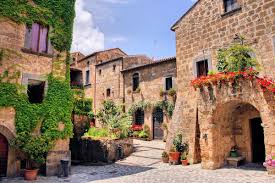Want to buy a $1 home in Italy? The best advice from 3 people who did it

Rome: For years now, people around the world have been captivated by Sicilian towns selling off abandoned homes starting at 1 euro, or roughly $1.08.
Several hundred homes have been sold to curious and ambitious renovators, including Meredith Tabbone, 44, of Chicago. She learned in 2019 that a town called Sambuca di Sicilia was auctioning off homes starting with 1-euro bids.
“A lot of people warned me that it could be a scam [and that] I could end up losing a lot of money,” she tells CNBC Make It.
Still, she took up the idea when she realized her great-grandfather was actually from Sambuca. She placed her bid on a home for 5,555 euros sight unseen and won, thus starting her on a four-year journey of renovations.

Meredith Tabbone says she’s never done a renovation project like this before, but she was inspired by the work of her father, who was an architect.
“From the moment that I sent in the bid and checked my email every day and found out that I won, all the way through this process, there have been 4 million moments of frustration, exhaustion, contemplation of how to move forward,” she says.
Tabbone and other 1-euro homebuyers share their biggest pieces of advice to other aspiring renovators around the world.
Sicily’s homes may start at 1 euro, but the cost is largely symbolic and just the start of more expenses down the line.

In Mussomeli, one of the most famous 1-euro towns, buyers must also pay a realtors fee of 500 euros and pay for the deed, which costs 2,800 euros. That adds up to a total of 3,301 euros, or nearly $3,600.
Rubia Daniels, 50, of Berkeley, Calif., bought three 1-euro homes in Mussomeli in 2019. So far, she’s focused her efforts on renovating her main vacation home. She originally thought it would cost her $20,000 but has already spent $35,000 between materials, labor and furniture. She hopes to stay under $40,000.
Tabbone paid 5,555 euros for her home, plus some taxes and fees, bringing the home sale up to 5,900 euros, or roughly $6,400. She then bought the building next door through a private sale with the owner for 22,000 euros, or nearly $24,000.
Over the next four years, Tabbone spent about 425,000 euros on renovations, or roughly $463,000. Altogether, that adds up to 430,900 euros, or $469,500 for her dream home in Sicily.
Speaking of renovations, though communicating with local construction workers can kick off plans, buyers say it’s crucial to be on the ground while work is being done.
Danny McCubbin, an Australian native who bought a 1-euro house in Mussomeli, says he’s seen “quite a few” foreigners try to manage their project from their home country.
McCubbin bought his cheap Sicilian home in 2019 with hopes to turn it into a food-rescue charity. He ended up selling his house back to the real estate agency after it experienced extensive, and costly, water damage. But he managed to open his charity, The Good Kitchen, elsewhere in town.
“It’s best to actually be here with the builder, choosing the tiles, choosing whatever you need,” he says. For the times you can’t be there in-person, he also recommends finding a local project manager who can speak English and Italian to communicate plans with the local crew.
Daniels works in construction and learned quickly that things in Sicily take much longer than they do in the U.S.
“Working with contractors in Sicily, I had to learn how to set my expectations, but not my American expectations,” she says.
Have patience to understand the culture and how business is done so you don’t get frustrated, she adds. She’s been renovating her main home in Mussomeli on and off since 2020 and is still several months from finishing.
“Overall, there’s plenty capable people to do the work,” Daniels says, but “the work here, it flows in a different way. You have to remember this is an island and they are in an island time. So [things] just move a little bit slower than what you expect.”
If you’re planning to buy real estate in another country, it’s best to spend a good amount of time there. And don’t only go when it’s peak travel season.
“I always say come for longer than one or two weeks,” McCubbin says. “And most importantly, come in winter. In summertime it’s beautiful. It’s sunny, the houses, there’s no mold in them. You discover in winter that a lot of these houses do have mold. They do have moisture, and it’s a very different feel here than in summer.”
Danny McCubbin had to give back his 1-euro home after it experienced extensive damage, but he found a way to launch his charity, The Good Kitchen, in Mussomeli’s town square.
Tabbone, Daniels and McCubbin agree that it’s crucial to learn Italian in order to really get around Sicily, especially if you plan to spend part of your year there.
Language-learning apps and courses are a good place to start, but immersing yourself among locals is another great way to practice.
Tabbone says she enjoys spending time with Sicilians when she visits. Her first friends in Sambuca included members of the construction crew on her project, who then introduced her to their friends and family members. She also has a close relationship with the town’s mayor — she practices her Italian with him and he practices his English with her.
“I think I would be extremely fluent in Italian if Google Translate did not exist,” she jokes, “but I’m very, very proficient at Google Translate.”
Newcomers to Sicily may be attracted by inexpensive houses, but many say their biggest reason for staying is the people they meet along the way.
“I always say, don’t be allured by the fact that the houses are cheap,” McCubbin says. “Think about where you want to be and where you want to spend your time. Having said that, people here are kind. People here are very friendly. It’s a great place to live.” McCubbin now lives in Mussomeli full-time and owns another house there.
Tabbone says one of her favorite things about Sambuca is how she can connect with fellow foreigners as well as long-time residents.
“One of the things that I love the most about Sambuca is that the community is not just expats who are moving here. It’s really well intertwined with the locals and the community. Any dinner party that you go to, even if you just go to a cafe on the street, you will always see a very nice mixture of expats and of locals, and I love that.”
Conversions from euros to USD were done using the OANDA conversion rate of 1 euro to 1.08 USD on March 22, 2024. All amounts are rounded to the nearest dollar.





